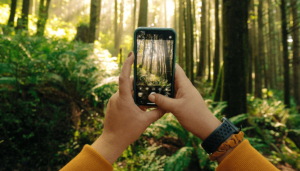
The Best Period Tracker Apps of 2025
The 5 Best Period Tracker Apps of 2025 Finding the Best Period Tracker App for You Published on August 8th 2025Written by Jesse Driessen When it
Published on October 28th 2022
Written by Jenna Farmer
Key points.

Photo by Pixabay.
Sometimes it can feel as if our anxiety comes out of nowhere. Ever been in the middle of dinner or a work meeting and have an anxious thought pop into your head? Well, you’re not alone. In fact, 264 million people worldwide struggle with anxiety. Some of us know what triggers our anxiety (particularly if you are anxious about a specific part of life, such as social anxiety) but the rest of us are left wracking our brains. The truth is that there are tons of different triggers that can start an anxiety spiral. Let’s take a look at some of the most common causes for what triggers anxiety.
Anxiety can best be described as feeling uneasy, on edge or having a specific worry or fear. Most of us feel anxious at some point (whether it’s exam stress or pre-date nerves) but for some of us,it sticks around for longer. When anxiety happens frequently or it seems impossible to banish those worrying thoughts, you might be diagnosed with an anxiety disorder.
“Everyone experiences feeling anxious at some time or another. That’s perfectly normal. But for those of us who experience an anxiety disorder we’ll experience anxiety or worry about a wide range of situations and issues. Everyone deals with anxiety differently. Worrying excessively might mean you feel on edge, anxious and restless. You might seem irritable to other people or have trouble sleeping. If someone is excessively worrying about social situations, they might withdraw from those situations entirely and not see their friends and family as much as they might usually like to.” Becky Cotton, Co-founder of Lumino.
There Are several different types of anxiety disorder. For example, generalised anxiety disorder describes those who get anxious about a whole range of different things. Social anxiety disorder centers around having a high level anxiety about how we are viewed by others or being in social situations. Whilst OCD (obsessive compulsive disorder) is a type of anxiety in which those affected undergo obsessive rituals (such as constantly washing their hands or checking things constantly). What all these conditions have in common is anxiety are at their core.
There are many symptoms of anxiety. In fact, there’s not enough time to mention them here as you’d be scrolling for hours! Let’s start with the mental symptoms of anxiety. When we’re anxious, we might not be able to control feelings of stress or worry. You might notice yourself feeling on edge or if something terrible is lurking just around the corner. If these symptoms won’t go away and you have anxiety disorder, this can hugely impact your overall mental health: you may be super irritable, feel fatigued or unable to sleep or struggle with brain fog and confusion.
Anxiety can also cause physical symptoms and it’s important to stress (whatever anyone may have told you), these aren’t just in your head. If your anxiety is short lived, you might notice your heart racing slightly or sweating more than usual. However, if your anxiety is more severe and you suffer from anxiety disorder then these physical symptoms might be more prominent: you might struggle to sleep, feel trembly, have digestive issues, headaches or not feel like eating.
Some studies also suggest long-term anxiety may also increase your chance of developing certain health conditions, such as diabetes or heart problems, although that doesn’t mean you definitely will. But being aware of the long-term health implications of anxiety is important so you can understand the risks and do your best to manage them.
Anxiety is different for everybody and there’s no single cause. Some of us can pinpoint where our anxiety began (for example, in response to a traumatic life event) but lots of us aren’t exactly sure why we feel this way.
Science tells us there’s lots of potential causes of anxiety. Anxiety can run in families but that’s not to say it’s always genetic. Research has found there’s many different genes that are linked to anxiety but there’s tons of other things that influence our brain too.
Certain medical conditions could make you more prone to anxiety. For example, people with Crohn’s Disease are more likely to be diagnosed with anxiety and half of patients with chronic pain develop anxious symptoms.
Of course, our environment plays a huge role in anxiety also. Being exposed to stress or negative life events also increases your risk of getting of anxiety. For people who exposed to something really traumatic, the rate of developing Post Traumatic Stress Disorder or Anxiety is around 30-40%.
Finally, there can even be general lifestyle causes. For example, even drinking caffeine or alcohol may cause you to develop anxiety in the short-term.
Whilst you may not know what causes your anxiety, it may be easier to spot certain triggers. Triggers are things that flare-up or worsen your anxiety and identifying them can make it easier to keep anxious thoughts at bay. There are lots of different common triggers so not everyone will apply to you.
1. Caffeine.
Caffeine, which is found in things like energy drinks and coffee, can make anxious thoughts worse in some people. One study found higher levels of anxiety with increased caffeine consumption.
2. Alcohol.
Research has found drinking too much alcohol can poorly impact your mental health. Read our guide on anxiety and alcohol for more information.
3. Skipping meals.
When we skip meals or eat erratically, it can mean our blood sugar isn’t steady. This imbalance can leave us feeling jittery and create anxious thoughts.
4. Bad news on the TV and in the media.
Doomscrolling, where we spend ages reading bad news stories on our phone, is a real thing. We live in a scary world right now so seeing this project on our TV and phone screens can trigger anxiety. More than 50% of Americans say that watching the news causes them stress “Bad news on the TV can be a big cause of catastrophic thinking, for example worrying about money and then seeing a news report on mortgage payments doubling can cause some people to negatively fantasise about a future where they can’t afford their mortgage and lose their house-which can trigger lots of anxiety and panic.” says Psychotherapist Laura Drane.
5. Social media.
As well as being surrounded by the news, social media is also a place to catch a glimpse of other people’s lives. Whilst the connections we find online can often be positive, it’s important to acknowledge the negative parts of social media too. Many studies have found a strong connection between heavy social media and an increased risk of anxiety. Sometimes, online connections can be super helpful (for example, you might be part of a mental health support group or connect with others who have the same chronic illness as you) but it can bring with it a hefty dose of comparison-itis.
6. Socialising.
“Social anxiety is when we feel anxious about being amongst people-it often prevents people from accepting social invitations and it can also make it really difficult to manage things like interviews. If it carries on it can lead to social isolation” explains Sally Potter, a Solutions Focused hypnotherapist.
Identifying triggers is key to getting to grips with anxiety. There are a few different ways to do this. You might choose to use a symptom journal and keep detailed notes. Another option is to do this on your phone using the Bearable app to track different triggers and symptoms to understand how they correlate with one another. When identifying triggers, it’s important to make sure you keep a record for long enough so you can notice patterns. You may find that you actually have a combination of triggers (for example, a glass of wine may not be a trigger alone but several glasses followed by too many cups of coffee may be).
When you’ve identified triggers, you can then think of ways to manage them. It really depends on what your trigger is. For example, if alcohol is a trigger for you, you may look to cut down on your drinking. If caffeine makes your anxiety worse, switching to decaf is a simple thing you can do to make life easier. It’s also important to be aware of simple healthy habits falling by the wayside-such as drinking enough water or eating 3 balanced meals a day-as this can hugely impact your mental health.
However, some triggers are harder to handle. If news or social media make your anxiety worse, it may be unrealistic to unplug the TV or delete the instagram app for good. However, you can take back some control: for example, you might turn off app notifications so you don’t receive social media updates constantly or use a site blocker to control the amount of time you spend scrolling the news on your computer. Research has found other positive interventions, such as keeping a gratitude journal, make you more optimistic and as a result this may help us cope better with bad news events. “Follow positive accounts and hashtags on social media and be mindful of how much TV news you consume.”says Psychotherapist Laura Drane.
You might want to take a second to take yourself away from the trigger. “One of the best ways to take back control of anxiety triggers is using breath to give yourself some space. Breathe in through your nose, pause and then breathe out through your mouth until you feel calm. Then reassess the situation and choose how to respond. Learning to visualise what you want, rather than what you don’t want, can be extremely helpful. So create a rich visual picture of a situation going really well-with you at your most relaxed and happy. Doing this creates a new ‘memory’ and the more you practice, the more it will be easier to find this good memory,” says Sally Potter.
For more info you can read our blog post about the 6 best science backed coping strategies for anxiety here.
Whilst anxiety is common, it’s also important to reach out if you’re struggling with it or if your symptoms are impacting your work, social life or other parts of your daily life. Remember that anxiety (which all of us get once a while) is different to anxiety disorder (when anxiety is more long-term and harder to shift). If you feel that you have anxiety disorder or that your anxiety isn’t well managed, then it’s important to reach out to a GP or Counsellor for support.
There’s lots of different resources you can access if you’re struggling with anxiety:
Resources for those with anxiety in the UK:
Resources for those with anxiety in the US:
The information provided is for educational purposes only, and is not a substitute for professional medical advice. Consult a medical professional or healthcare provider if you’re seeking medical advice, diagnoses, or treatment.
Anxiety Statistics, SingleCare.
https://www.singlecare.com/blog/news/anxiety-statistics/
Becky Cotton, Lumio.
https://hellolumino.com/
Anxiety, fear, & panic, NHS.
https://www.nhs.uk/mental-health/feelings-symptoms-behaviours/feelings-and-symptoms/anxiety-fear-panic/
Anxiety & panic attacks, Mind.
https://www.mind.org.uk/information-support/types-of-mental-health-problems/anxiety-and-panic-attacks/symptoms/
Genetics of generalized anxiety disorder and related traits, Gottschalk, et al.
https://www.ncbi.nlm.nih.gov/pmc/articles/PMC5573560/
Does anxiety run in families, UNC Health Talk.
https://healthtalk.unchealthcare.org/does-anxiety-run-in-families/
The Impact of Anxiety and Depression on Patients with Inflammatory Bowel Diseases, Crohn’s & Colitis Foundation.
https://www.crohnscolitisfoundation.org/blog/impact-anxiety-and-depression-patients-inflammatory-bowel-diseases
Protective and Risk Factors at the Intersection of Chronic Pain, Depression, Anxiety, and Somatic Amplification: A Latent Profile Approach, Kim, et al.
https://www.dovepress.com/protective-and-risk-factors-at-the-intersection-of-chronic-pain-depres-peer-reviewed-fulltext-article-JPR
Is anxiety genetic, Healthline.
https://www.healthline.com/health/mental-health/is-anxiety-genetic#causes
Anxiety Disorders, National Institute of Mental Health.
https://www.nimh.nih.gov/health/topics/anxiety-disorders#part_2222
Prevalence of post-traumatic symptomatology and anxiety among residential nursing and care home workers following the first COVID-19 outbreak in Northern Italy, Riello, et al.
https://www.ncbi.nlm.nih.gov/pmc/articles/PMC7540798/
Caffeine Intake and Mental Health in College Students, O Bertasi, et al.
https://www.ncbi.nlm.nih.gov/pmc/articles/PMC8099008/
Skipping Meals Is Associated With Symptoms of Anxiety and Depression in U.S. Older Adults, Loretta Anderson.
https://www.ncbi.nlm.nih.gov/pmc/articles/PMC7742741/
You Asked: Is It Bad for You to Read the News Constantly? Time Magazine.
https://time.com/5125894/is-reading-news-bad-for-you/
Laura Dane, Addiction Recovery Therapy.
https://www.addictionrecoverytherapy.co.uk/
Social Media and Mental Health, Help Guide.
https://www.helpguide.org/articles/mental-health/social-media-and-mental-health.htm
Sally Potter, Hypnotherapist.
https://alofthypnotherapy.com/
Protecting the brain against bad news, Robin Blades.
https://www.ncbi.nlm.nih.gov/pmc/articles/PMC8096381/
Help someone out by sharing this article with them …

The 5 Best Period Tracker Apps of 2025 Finding the Best Period Tracker App for You Published on August 8th 2025Written by Jesse Driessen When it

Allergy Tracker App The best apps for tracking allergies in 2025 Published on March 31st 2025Written by Jesse Driessen Living with allergies—whether triggered by food,

Seasonal Affective Disorder and Depression Published on November 5th 2024Written by Jesse Driessen What is Seasonal Affective Disorder? Approximately 15 million Americans are thought to